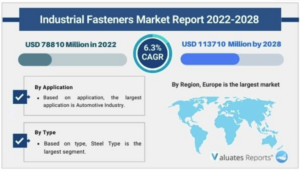The global industrial fasteners market size is estimated to be worth U.S. $78,810 million in 2022 with a growth in size to $113,710 million by 2028 — with a CAGR of 6.3%. This is according to a new study published by Valuates Reports, which offers in-depth market insights into various industries.

To learn more or download the report, click here.
The key players in the industry iclude Würth, PCC, ITW, Alcoa, and others, with the top four global manufacturers holding a share of about 10%. Currently, Europe is the largest market with a share about 30%, followed by North America and China, each with a share of about 50%.
In terms of product, steel is the largest segment with a share of approximately 90%. The largest application is in the automotive sector, followed by electronics, machinery, construction Industry, and MRO.
Trends
The industrial fasteners market is expected to grow, thanks due to increasing global construction activity. Fasteners are used in the construction industry to temporarily join two or more objects together. To ensure a safe and strong final construction, each project requires a different type of fastener.
Fasteners are also essential components in a variety of industries, including automation, aerospace, manufacturing, infrastructure.
Automotive bolts, nuts, screws, and inserts are commonly used to clamp vehicle parts together to prevent them from separating while transmitting driving loads, as well as to prevent leakage of engine and gearbox joints and to secure sheet steel parts. The easily replaceable nature of automotive fasteners makes it convenient for end-user consumers to purchase fasteners for their vehicles, boosting the aftermarket segment.
The industrial fastener market is expected to grow as a result of this factor.
Additionally, the growing use of fasteners in the electric and electronic industries is expected to propel the industrial fastener market forward. Fasteners for securing electronics are designed in such a way that they eliminate the need for additional security measures, such as ball bearings and lock nuts, lowering the cost of securing the electronics. The fact that the use of such screws does not necessitate any changes to the joint or process technology to install them also helps.
Fasteners are also used in medical devices, surgical equipment, and medical implants. Implant fasteners are made of special metals, such as titanium, which can be safely inserted into the human body without corroding or degrading. For implants, large bolts are used to attach miniature pins and shafts.
The report offers an in-depth breakdown of fasteners by type and application segments, including sub-segments. It also provides sales and revenue forecast data by type and application segments based on sales, price, and revenue for the period 2017-2028.
Click here to learn more.





Tell Us What You Think!